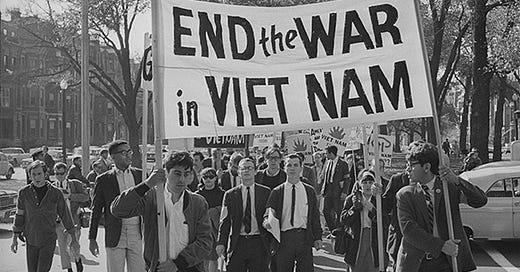Vietnam War Protests
The involvement of the hippie movement in Vietnam War protests is a significant chapter in the history of American social and political activism during the 1960s and early 1970s.
The hippie movement, with its core values of peace, love, and communal living, naturally opposed the Vietnam War, which they saw as an unjust and unnecessary conflict that contradicted their ideals of nonviolence and harmony.
Early Opposition and the Peace Movement
The opposition to the Vietnam War among hippies was part of a broader antiwar movement that began to gain momentum in the early 1960s. This movement included students, religious groups, and civil rights activists, who were all united in their opposition to the war for various reasons, including moral, political, and economic concerns.
Key Figures and Groups
Abbie Hoffman and Jerry Rubin: Founders of the Youth International Party (Yippies), Hoffman and Rubin were prominent figures in antiwar demonstrations. They used theatrical and provocative protest techniques to draw media attention and public sympathy for their cause.
Allen Ginsberg: A leading figure of the Beat Generation, Ginsberg was an influential poet who actively participated in antiwar protests. His poem "Howl" became a manifesto for the counterculture movement.
Jane Fonda: An actress and political activist, Fonda was outspoken in her opposition to the Vietnam War. She traveled to North Vietnam in 1972, an act that was controversial and led to significant backlash.
John Lennon and Yoko Ono: The famous Beatle and his artist wife were vocal critics of the Vietnam War. Their bedins for peace and the song "Give Peace a Chance" became anthems for the antiwar movement.
Major Events and Protests
The March on the Pentagon, 1967: This massive protest brought together tens of thousands of antiwar activists, including many hippies, to march against the Department of Defense headquarters. It was one of the most significant early protests against the Vietnam War.
Woodstock, 1969: Though not a protest per se, the Woodstock Music and Art Fair became a symbol of the counterculture era, with many attendees expressing their opposition to the Vietnam War through music and peaceful assembly.
The Moratorium to End the War in Vietnam, 1969: This was a massive demonstration and teachin across the United States. It was one of the largest antiwar protests, showing the widespread opposition to the conflict.
Kent State University Shooting, 1970: The shooting of unarmed college students by members of the Ohio National Guard during a protest at Kent State University galvanized public opinion against the war.
Legacy
The hippie movement's involvement in the Vietnam War protests played a significant role in shaping public perception of the conflict. Through their activism, they were able to bring attention to the human cost of the war and promote their ideals of peace and love. While the movement itself eventually waned, the legacy of their activism remains a powerful example of political engagement and social change.


